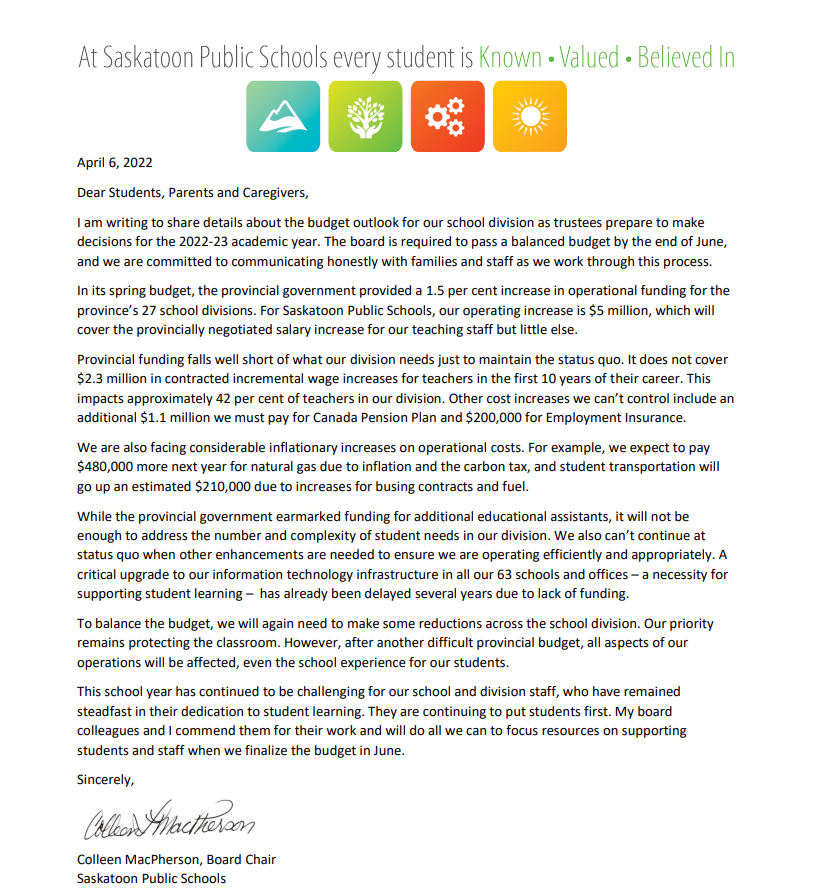Saskatoon’s two main school divisions sent out letters to families, students and parents Wednesday and Thursday, outlining their concerns with the lack of funding from the provincial government for the next school budget for the 2022/23 academic year.

This follows the Chinook School Division in Swift Current after they sent a letter out to parents and staff.
The school divisions are warning the 1.5-per cent increase in provincial funding simply won’t cover all the necessary needs to ensure a quality learning experience for students and the necessary funds to staff faculty including student assistants (EA).

School divisions say the effects could be felt in areas like student transportation, the quality of school experience and providing essential means of student mental health outreaches.
The chair of the public school division Colleen MacPherson says much of the increase will go to salary increases for teachers, which was negotiated in the last round of bargaining.
“Whether we (are) a big urban or a rural school board, these challenges are very real,” said MacPherson. “I don’t ever recall where so many people (staff and parents) have voiced their disappointment in the provincial budget before.”
- High blood pressure drug recalled over low blood pressure pill mix-up
- ‘Doesn’t make sense’: Union files labour complaint over federal 4-day in-office mandate
- Canadian Tire ordered to pay nearly $1.3 million for false advertising
- Ottawa gives Canada Post a $1.01-billion loan amid ongoing financial struggles
MacPherson says students’ mental health also took a big hit during the pandemic, and there were outlets and help for them, but that will likely disappear too due to lack of funding.
“Provincial funding falls well short of what our division needs just to maintain the status quo. It does not cover $2.3 million in contracted incremental wage increases for teachers in the first 10 years of their careers. This impacts approximately 42 per cent of teachers in our division.”

Get daily National news
The letter added while the provincial government earmarked funding for added educations assistants, it’s simply not enough for the number complexities of needs of students in our division.
“We also can’t continue at the status quo when other enhancements are needed to ensure we are operating efficiently and appropriately. A critical upgrade to our information technology infrastructure in all our 63 schools and offices — a necessity for supporting student learning — has already been delayed several years due to a lack of funding.”
The letter from the Catholic School Division highlighted the need for funding to provide the best available education possible for students.
“Just like your ability to pay for things is being eroded by paying a higher price for the same goods and services, the school division’s ability to pay for the same things and maintain service levels for students will be negatively affected,” the letter read.
“Preliminary estimates indicate the division will be over $2 million short if we want to maintain our current level of service to students. This is disheartening, to say the least, especially when we all know that additional post-pandemic funds will be needed to re-engage students and offer appropriate mental health and wellness support,” the letter added.
School division board chair Diane Boyko says the budget will make it difficult to get out of a financial hole while maintaining top-notch learning.
“We currently find ourselves roughly with a $2.2 million deficit for the Greater Catholic school division. We have some difficult decisions ahead of us,” said Boyko.
“We are finding ourselves with things like inflation, transportation, utilities, and teachers’ bargaining agreement. There are various circumstances where we are going to have to do makeup that backfill.
“We can’t do more with less.”
The letter sent by the Catholic School Division can be read here.
Ultimately schools will have to find ways to save money, but at the same time not cut essentials tools for learning, which will be challenging.
Saskatchewan education minister Dustin Duncan says while the budgets will be challenging, they can be done.
“Inflation is a minor factor of the budget,” said Duncan. “Enrolment is a large driver of the school budget. In terms of fuel costs it does range, it’s about 13 per cent of the transportation total budget for the larger urban divisions. Rural divisions its roughly two to four per cent.”
He adds there should be some natural ways of decreasing the budget such as retiring teachers, and also adds that they are expecting many divisions to see lower enrollment, in fact nearly half of the school divisions should see lower enrolment.
“Services they are able to provide, what that looks like, it’s based on enrolment. There is turnover every year of retiring teachers at the higher end of the grid, being replaced by teachers at the lower end of the grid.
“I know school divisions are going to try very hard to keep reductions in services in the classroom down as much as possible.
“We know there are major drivers, the narrow category of fuel costs, it’s a smaller slice of the pie for the budget.”
Duncan says he will be involved in continued discussions with board chairs from all the divisions as they finalize their budgets by the end of June for the 2022/23 year.
“I’ll be going to Saskatoon and speaking to the (school divisions and board chairs),” said Duncan. “I know the board chairs will be there. We will be having discussions with the chairs over the coming weeks.
“I will also be meeting with the students and want to hear what they have to say about the budget and their understanding of it.”









Comments